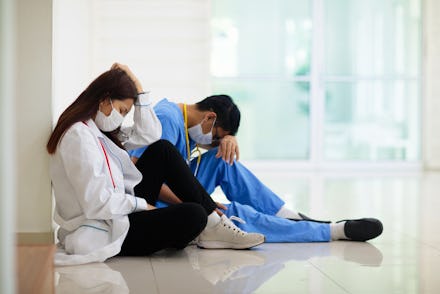A new poll has measured exactly how miserable Americans are right now

The coronavirus pandemic forced many people across the country to dramatically restructure their daily lives. Usual recreation options — like gyms, restaurants, and movies — were closed, forcing people to spend a lot of time at home. Now, a new poll shows exactly how that isolation time affected us, as it appears coronavirus took a significant mental health toll on Americans.
Online, there are a lot of jokes about cancelling 2020. It's not hard to see why. Our year started with a global pandemic that has killed over 100,000 people in the United States alone. And if that wasn't enough, the police killings of Black people like George Floyd and Breonna Taylor and violence against Black trans women have prompted protests across the country.
If you've felt a little more depressed than usual this year, you're not alone. In late May, NORC at the University of Chicago conducted the COVID Response Tracking Study to look at Americans' mental health and general outlook before, during, and after the coronavirus outbreak. For the survey, 2,000 people were polled.
The survey found that only 14% of respondents say they're very happy. Back in 2018, 31% of people said the same, so it's clear that numbers have taken a steep downturn. But to help put that into a little more perspective, Americans feel more depressed now than they did after 9/11, with 38% of respondents saying so now compared to 33%.
"For about two decades, 3 in 10 Americans said that, taken all together, they are very happy. In 2020, the number of people who say they are very happy hit a historical low of 14%, a 17 percentage-point drop since 2018," the survey said. "The percentage of people who described themselves as not too happy also spiked to an all-time high since the question was first asked in 1972."
NORC isn't the only research firm that has found Americans are dealing with severe mental health impacts from the pandemic. In early May, the Pew Research Center reported that one-third of adults have experienced psychological distress during the coronavirus pandemic.
The impacts of coronavirus are often only discussed in pure numbers; we look at how many people have died or lost their jobs. But climbing death rates and unemployment end up affecting people's mental health, which is harder to quantify. And it's likely that coronavirus is hurting some communities' mental health more than others.
During the pandemic, the U.S. unemployment rate rose to nearly 15%, which is the highest it's been since the Great Depression. And while the economy is slowly reopening, Black workers are being left behind. Earlier this month, the U.S. Bureau of Labor Statistics reported that the unemployment rate fell to 12.4% for white workers, but rose to 16.8% among Black workers.
In addition, three COVID Impact surveys by NORC for the Data Foundation found that Black people are more likely to say a family member or close friend died of COVID-19 or respiratory illness since March. Per the surveys, 11% of Black people reported being close with someone who has died, compared to 5% of Americans overall.
The pandemic and ongoing civil unrest throughout the country are impacting how people view the United States, too. A separate Gallup poll found that national pride is at a record low. Even though most respondents said they're "extremely proud" or "very proud" to be American, at 42% and 21% respectively, it's still a record low since Gallup's initial measurements began in 2001.
However, Gallup also reported that "the percentage of Americans expressing extreme pride in the country has been declining over the past 20 years, especially recently." After a burst of extreme national pride post-9/11, Gallup reported that readings fell to 61% in 2005 and remained steady — until 2015 when it dropped to 54%.